Waibao
Posted July 17, 2024 by Nova RuthOn our voyage, every invitation is a ‘rezeki’, a blessing and material abundance. As Javanese, we should not refuse a rezeki. We express this in our daily lives, such as considering dust as a rezeki. That means, when sweeping our house, we don’t sweep them outward, instead, we sweep them inward to honor the rezeki that has entered our house.
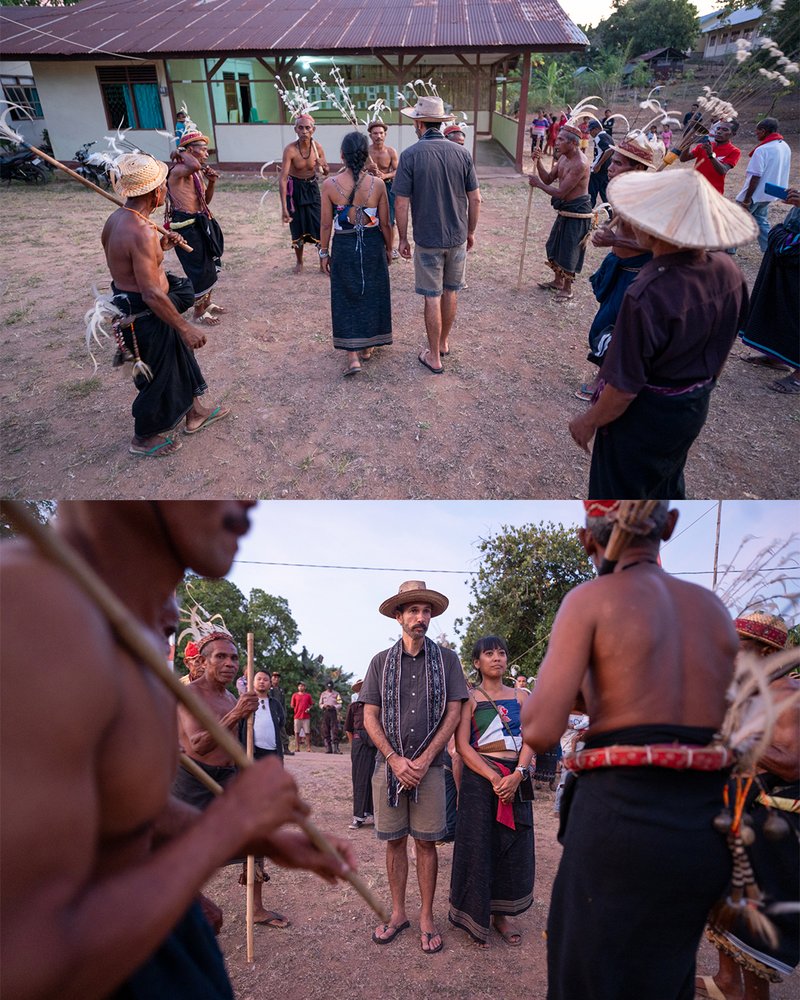
Three years ago, while sailing in the difficult times of the pandemic, we were welcomed by a man named Om Yance. The son of East Timorese regent during the new order era, Om Yance’s father was famous anti-corruption campaigner, despite running the poorest regency in Indonesia. This year Om Yance invited us back to a few spots around Flores, one of them was Waibao village, located on the remote dragon-head peninsula of East Flores. He had a lot to say about Waibao, enough for us to know that this is a rezeki that should be accepted.
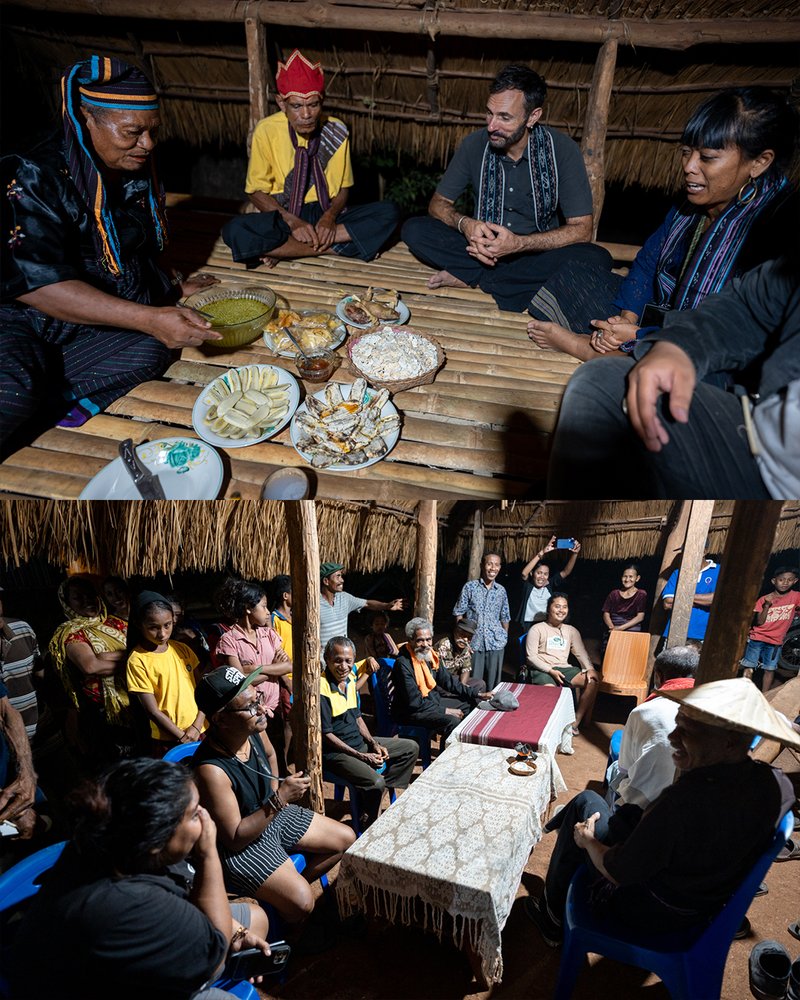
What intrigued us was the fact that this dragon head area in East Flores was where: 1. Majapahit Kingdom ships once anchored, and 2. Portuguese colonial ships first anchored and named the island Flores. They were both searching for spices in the same bay. Om Yance understood our mission with Arka Kinari, knowing how much we prioritize ecological values, that may not always align with tourism agenda of Indonesia.
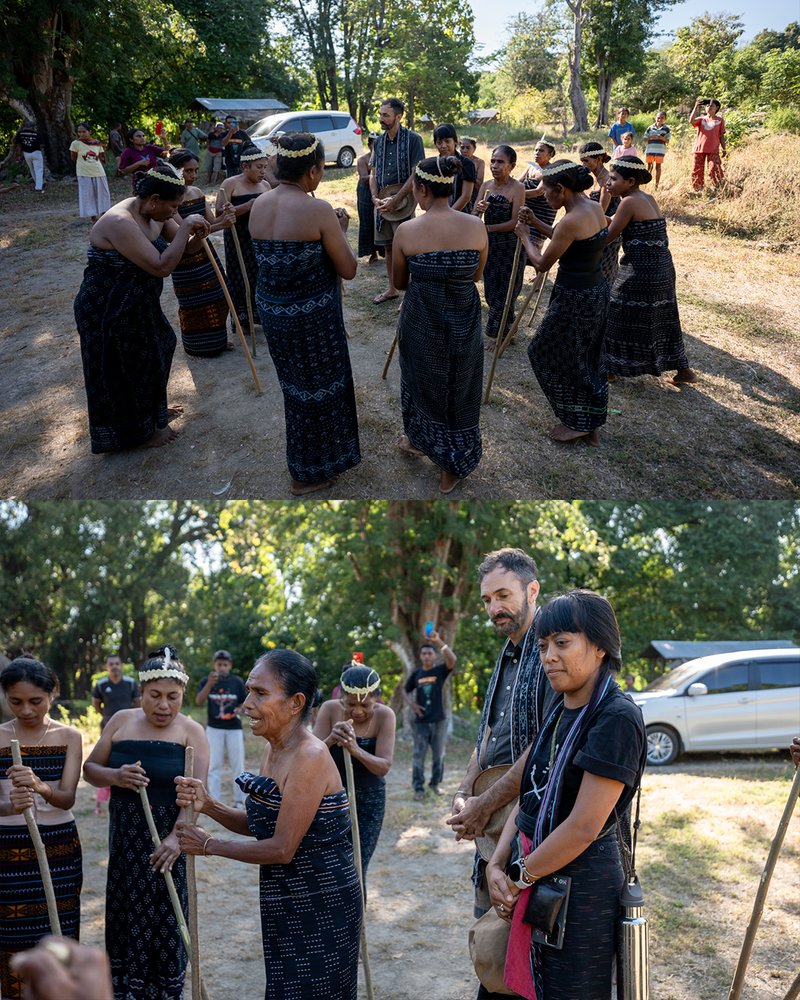
We disembarked to be greeted by residents at the kilometer zero of Flores, passing through cashew plantations, a large freshwater lake, and well-maintained roads to Riangpuho village, riding in the back of a pickup truck with no expectations. Before leaving the ship, I told Grey I would dress well and be ready to go on stage. Logic told me there wouldn’t be much time to prepare, even though our team, Hibat and Raka, had traveled ahead by land to set up early.
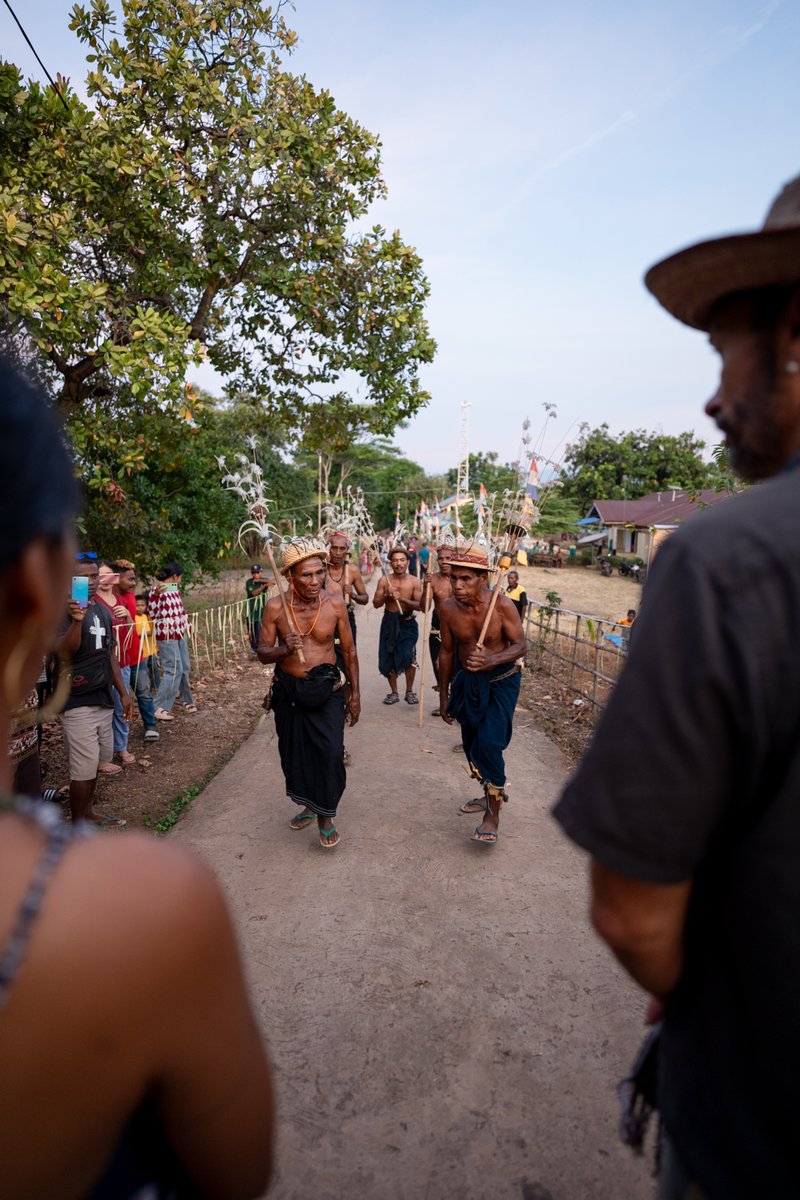
As we approached the village, we saw residents lined up along the road from afar. Palm leaves were twisted into ropes, decorated as a 'cover' for the village. Village elders and their warriors waited at the 'gate.' I was glad I had decided to dress for the stage, I thought. Grey felt unprepared but wasn’t too surprised by the welcoming ceremony. At the village 'gate,' separated by palm leaf ropes, facing each other, village elders recited verses. Grey was handed a machete to cut the palm rope, adorned with the traditional Waibao scarf, then offered betel nuts, young palm wine, tobacco wrapped in palm leaves, and guided by dancing warriors moving backward. We were accompanied by village elders, following their movements to the performance site.
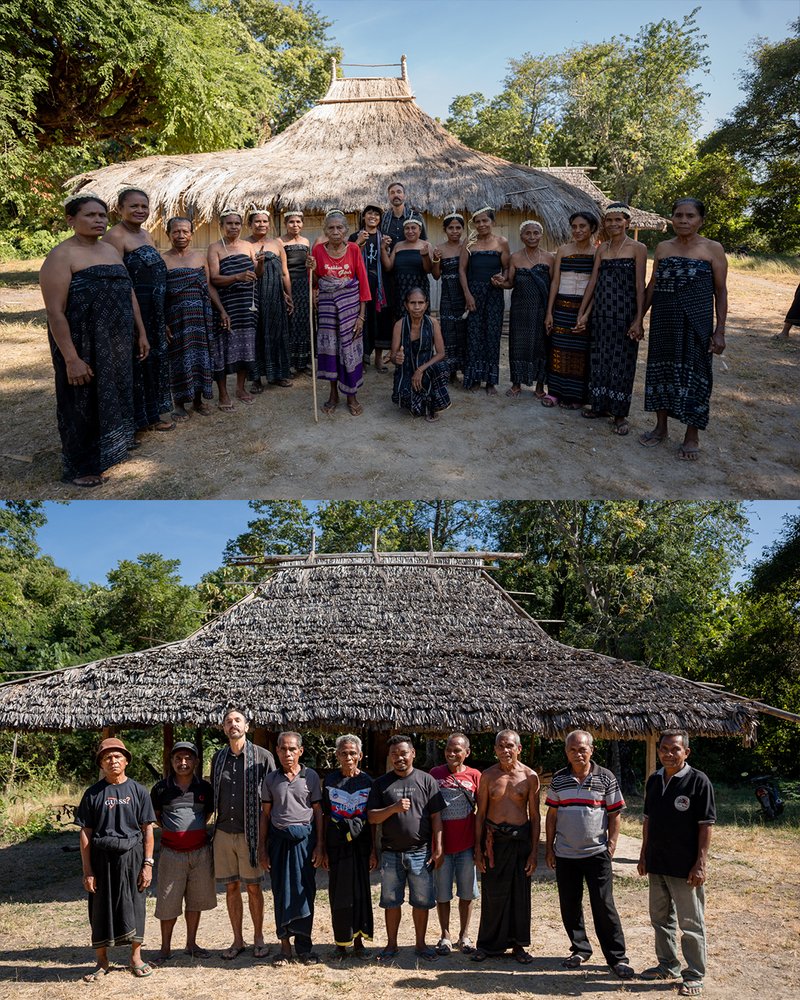
At the performance site, in front of the elementary school building, we were surrounded by dancing warriors, shouting in their native language, rhythmic, and slightly melodic. At times, the rhythm synced, and the dancers shouted together. It felt like a cleansing session from evil spirits clinging to our bodies.
As usual, we had no idea what would happen next. Should we set up right away? Should we wait? Would there be another ritual? Our minds were preoccupied with these questions. Our bodies appeared stiff, wrapped in uncertainty, yet also resigned to whatever would happen, knowing it would be beautiful.
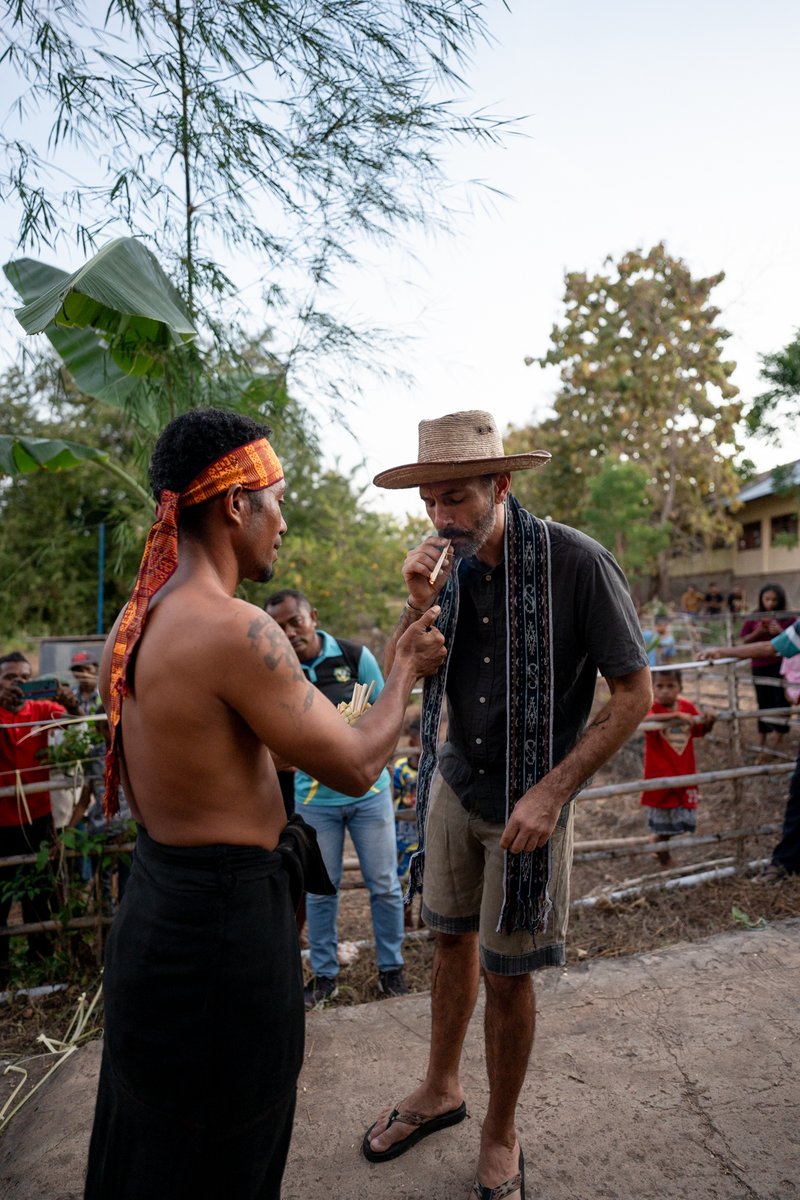
We were then led about 20 meters from the elementary school to the village office. In the yard, tents were set up, tables arranged, tobacco wrapped in palm leaves offered, and small local cakes wrapped in plastic. In such a context, it would be foolish to judge with our city thoughts, pretending to be ecological. "Why is there plastic? This isn't 'environmental'!" We sat on the prepared chairs, anxious because we hadn’t set up our equipment. 80% of the sound system and stage had been set up by our land team, helped by Asidewi volunteers, Fhelyn, Iwan, and Teddy.
We briefly set up, but that was a mistake! No one touched their coffee until we returned and joined them. Such was the hospitality in Riangpuho.
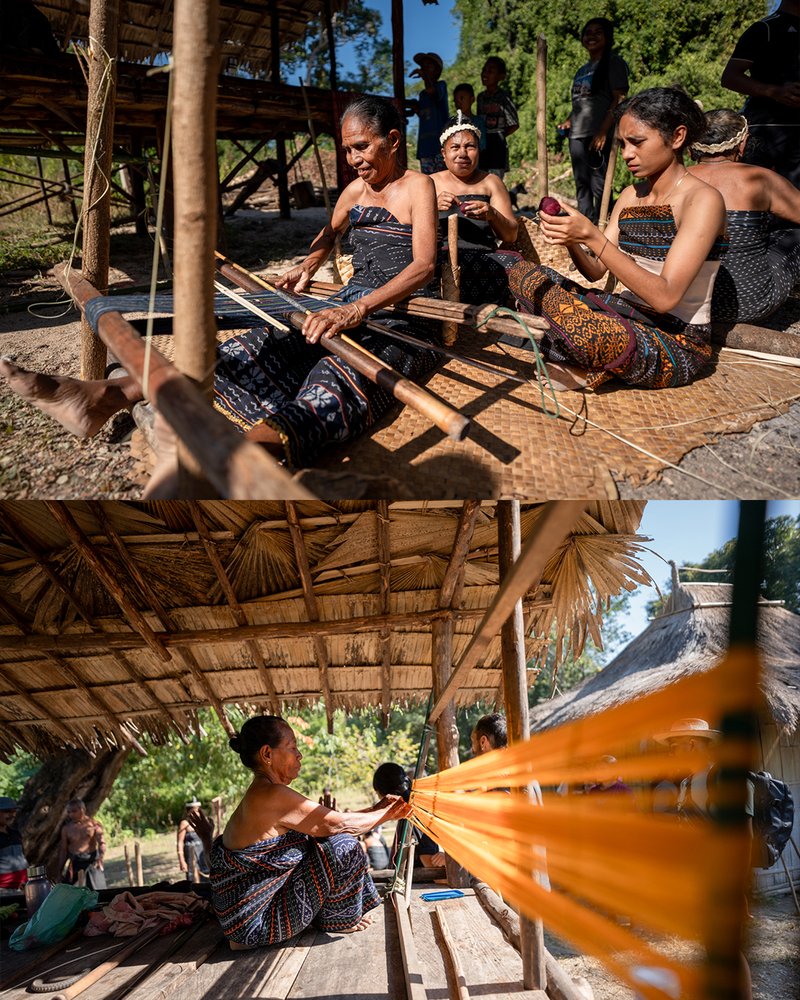
We were informed that their traditional house was ready to welcome us. Another welcoming ceremony awaited us. We walked ten minutes in the dark to gather at the Riangpuho traditional house. We were invited to sit in the stilt house while others sat at a long table under the stairs. Two elders accompanied us, and a middle-aged woman in traditional dress served food and drinks. The first consumptions was, of course, betelnut, followed by young palm wine, boiled village chicken, the broth, half-ripe grilled bananas sprinkled with arak sugar, and tobacco wrapped in palm leaves. Verses were recited by the village elders and replied by the host. Again, I imagined adding beatbox as it felt very rap-like! My heart was full at Riangpuho's traditional house. Smiles and laughter filled the conversations about how great the day had been and how we all felt the presence of our ancestors.
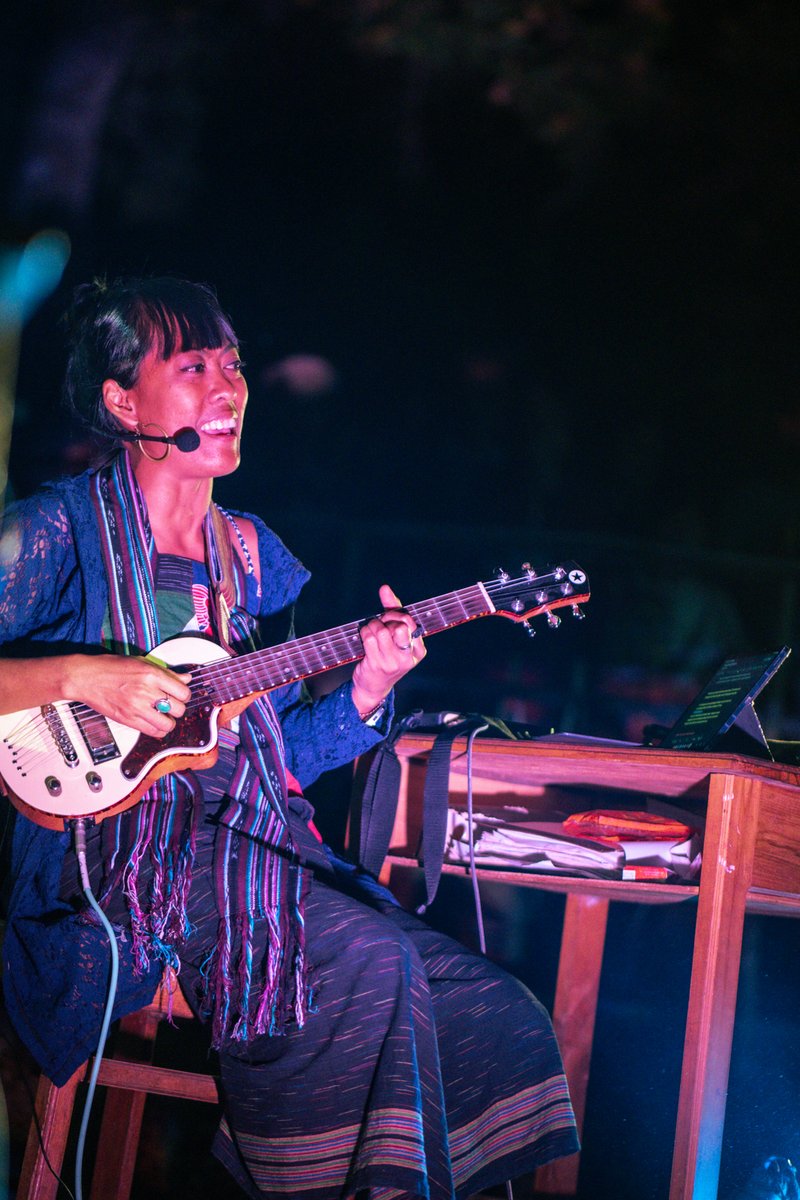
Caught up in the moment, we realized it was time to fulfill our promise. We set up our storytelling performance. With our sound system, lighting, and projector, we performed for about 300 attentive villagers, who commented on everything they saw and felt during the show, even small things like when I took a sip of water mid-performance. It wasn’t disrespect; it was their way of appreciating the show. We heard collective gasps of awe, especially when they heard how far we had traveled. It sounded like a chorus, in random tempo but nearly simultaneous.
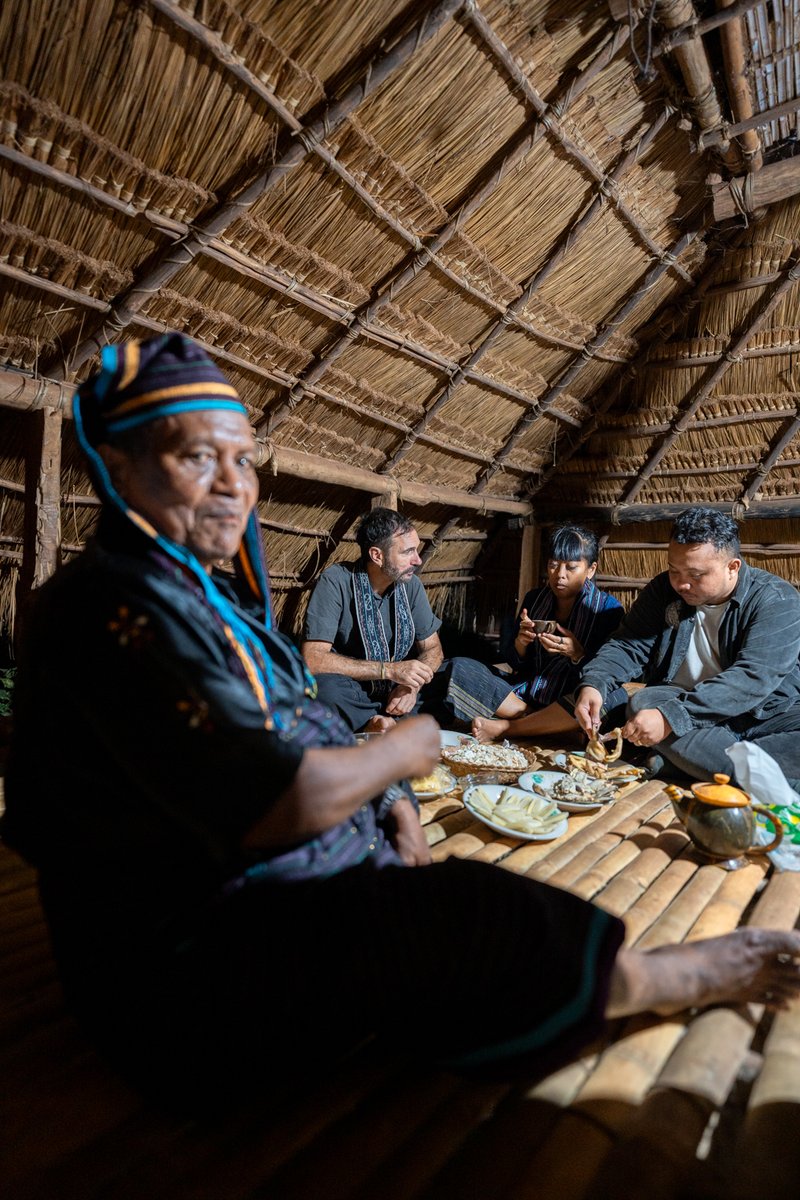
Late at night, another dinner awaited us. We sat with some villagers, discussing climate change under a cherry tree. The villagers were curious about our mission and concluded that our story was inspiring, teaching them not to give up in their struggle. They were facing a water crisis due to cashew plantations monopolizing clean water, mostly owned by foreigners. They were curious about how we survived at sea and discovered solutions on our ship that could be applied on land. Everyone that night was determined to visit our ship the next day, hoping to see how we desalinated seawater into drinking water.
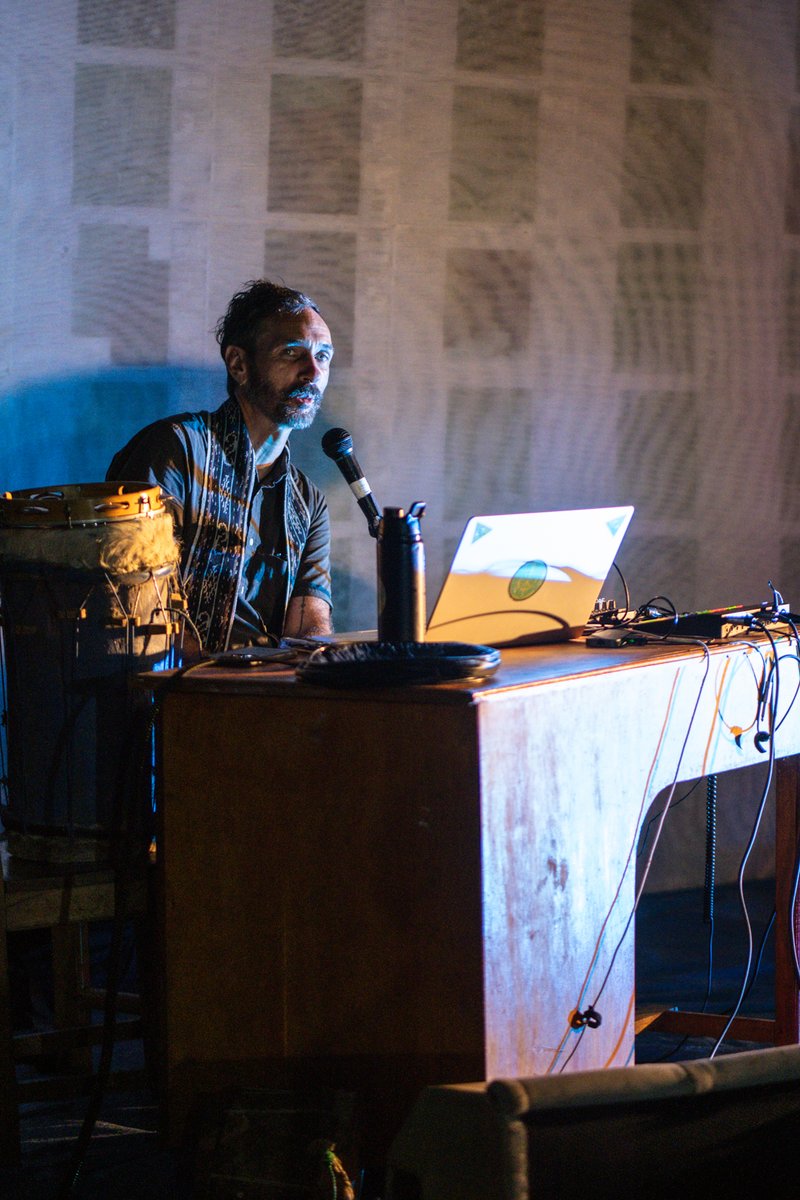
As the night grew late, we were taken to our lodging, a villager's house with two rooms for the four of us. Where did the homeowner sleep? That remained a mystery. As we drifted to sleep, black coffee with arak sugar and fried bananas were served the next morning. Assuming the villagers would gather as promised at nine in the morning to head to the beach and sail to Arka Kinari, the homeowner said it would mean a lot if Keka's traditional house could see us off. We couldn’t refuse. This time, the mothers prepared to dance and sing, encircling us with prayers and harmonies. After the men had cleansed the evil spirits, the mothers filled our hearts with love. In Keka, we also saw the making of traditional ikat and danced between bamboo sticks used as percussion, jumping to avoid their snapping at our feet.
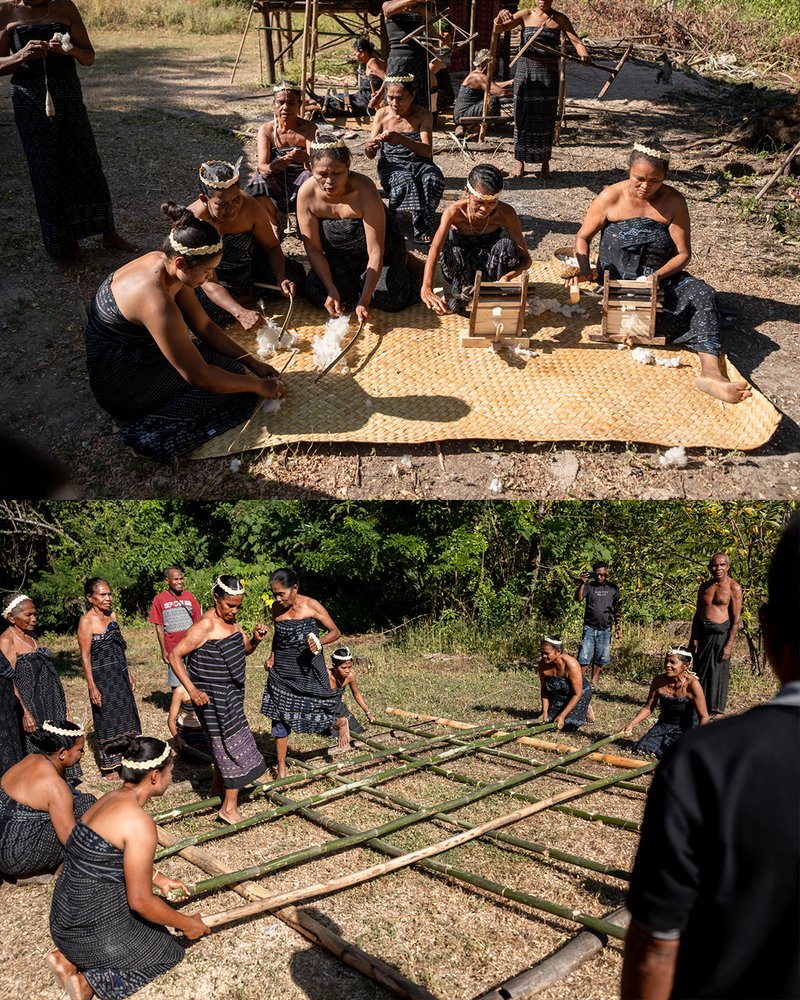
After hearing the stories in Keka, it was time to return to Arka Kinari. The path to the prepared boat was not as easy as described. It was steep and rocky. Our team had to carry the heavy sound system and our numerous musical instruments. A small and a medium-sized boat were prepared. Unfortunately, the medium-sized boat carrying the sound system broke down shortly after departure. The small boat pulled us back to Riangpuho, and we all transferred to a much larger boat that had never sailed before. The engine cooler wasn’t installed, and it only had one propeller. Waiting anxiously under the scorching sun, I prayed for the plan to be blessed. We needed to reach Arka Kinari, and the village elders and youths needed inspiration for their future. I had a hidden plan to invite the elders to recite verses on the ship for a spontaneous session of Laut Loud. Grey and I wanted our crew, who had worked overnight guarding the ship, to share in our joy with these village elders.
After a long, mysterious wait, the boat finally moved. About an hour later, in a new, untested, freshly painted boat, we arrived at the bay once visited by Majapahit and Portuguese, where Arka Kinari had anchored. For nearly three hours, we hosted Waibao villagers with coffee, tea, snacks, and a ship tour. I achieved my mission of recording the elders' verses in our kinship while waiting for the boat’s second propeller to be installed on the nearby beach. We were given Riangpuho's distilled arak and reciprocated with our merchandise. The village elders said the ancestral doors had opened since we shared betel nuts the previous night, and our kinship would be forever preserved.
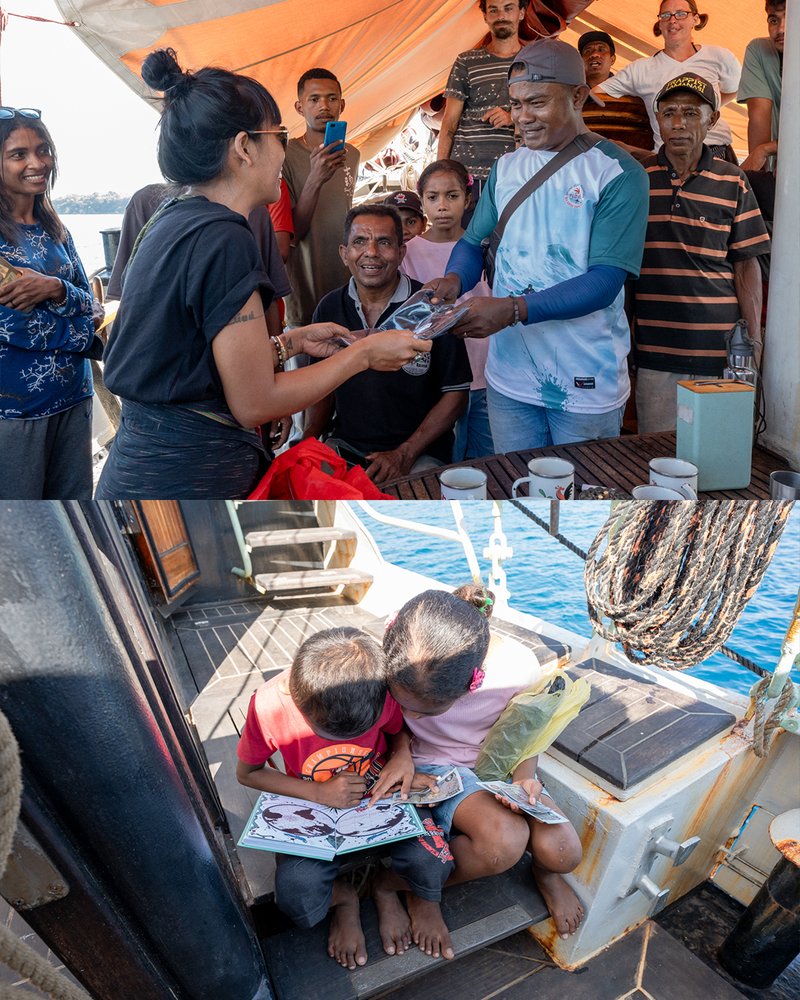
Created: 27 Aug 2024 / Updated: 27 Aug 2024




